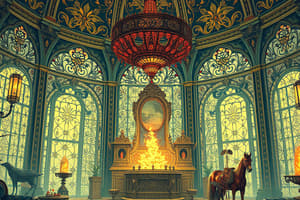Podcast
Questions and Answers
-
abstract – not concrete; theoretical
-
abyss – a deep gorge or chasm; a vast empty space
-
ballistics – the study of projectiles or firearms
-
bestial – lacking human feelings of pity or remorse
-
bewilderedly – in a confused manner
-
cacophony – an unpleasant combination of sounds
-
centrifuge – a device that separates substances
-
cinders – burned wood or fuel
-
condemnation – a pronouncement of guilt
-
devotion – a deep commitment of love
-
drear – a feeling of darkness and gloom
-
fathoms – depths of water
-
feigning – faking; pretending
-
flue – an outlet for smoke or heat
-
gorging – eating greedily and to excess
-
At the beginning of the story, how does Montag feel about his job? Give specific examples to support
your response.
-
What is your first impression of Clarisse?
-
What memory does Montag’s encounter with Clarisse arouse?
-
What is Montag’s reaction to Clarisse’s question: “Have you ever read any of the books you burn?”
-
What do Clarisse and Montag argue about? What does Clarisse tell Montag that firemen used to do?
-
Explain the significance of Clarisse’s speech about “blurs.” Why are billboards 200 feet long?
-
Why was Clarisse’s uncle arrested? What does this indicate about the society in which they live?
-
What question finally offends Montag?
-
What does his encounter with Clarisse remind him of?
-
What do you think the author meant when he said “How rarely did other people’s faces take of you and
throw back to you your own expression, your own innermost trembling thought”? What does this
question reveal about Montag’s state of mind?
-
How does the author describe Montag’s home?
-
Why do you think Montag did not want to open the curtains or windows?
-
What does Montag find under the bed?
-
Describe the machines. What do they do to Mildred? How do the men treat their “patient”? Why is it
so “routine” to them?
-
What does Montag hear after the men leave? What is his reaction?
-
abstract – not concrete; theoretical
-
abyss – a deep gorge or chasm; a vast empty space
-
ballistics – the study of projectiles or firearms
-
bestial – lacking human feelings of pity or remorse
-
bewilderedly – in a confused manner
-
cacophony – an unpleasant combination of sounds
-
centrifuge – a device that separates substances
-
cinders – burned wood or fuel
-
condemnation – a pronouncement of guilt
-
devotion – a deep commitment of love
-
drear – a feeling of darkness and gloom
-
fathoms – depths of water
-
feigning – faking; pretending
-
flue – an outlet for smoke or heat
-
gorging – eating greedily and to excess
-
At the beginning of the story, how does Montag feel about his job? Give specific examples to support your response.
-
What is your first impression of Clarisse?
-
What memory does Montag’s encounter with Clarisse arouse?
-
What is Montag’s reaction to Clarisse’s question: “Have you ever read any of the books you burn?”
-
What do Clarisse and Montag argue about? What does Clarisse tell Montag that firemen used to do?
-
Explain the significance of Clarisse’s speech about “blurs.” Why are billboards 200 feet long?
-
Why was Clarisse’s uncle arrested? What does this indicate about the society in which they live?
-
What question finally offends Montag?
-
What does his encounter with Clarisse remind him of?
-
What do you think the author meant when he said “How rarely did other people’s faces take of you and throw back to you your own expression, your own innermost trembling thought”? What does this question reveal about Montag’s state of mind?
-
How does the author describe Montag’s home?
-
Why do you think Montag did not want to open the curtains or windows?
-
What does Montag find under the bed?
-
Describe the machines. What do they do to Mildred? How do the men treat their “patient”? Why is it so “routine” to them?
-
What does Montag hear after the men leave? What is his reaction?
=
=
Flashcards are hidden until you start studying



